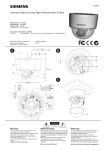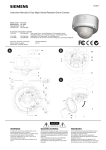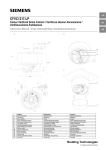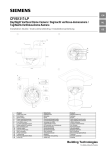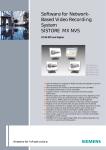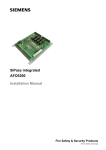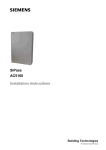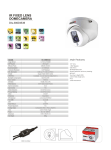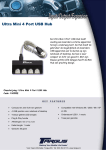Download Siemens CFFC1310-LP User's Manual
Transcript
English Instruction Manual for Colour Fixed Dome Camera Instructiehandleiding Fixed focus kleuren domecamera Installationsanleitung Fixfokus-Dome-Farbkamera Model number Modelnummer Typen-Nummer CFFC1310-LP CFFC1315-LP Part Code Art. code Art.-Nr 2GF1184-8AC 2GF1184-8AA Accessories / Accessoires / Zubehör CFFA-TD 2GF1086-8AA Tinted Lower Dome / NL: Getinte dome / De: Getönte Kuppel CFFA-IC29 2GF1086-8AB 2.9 mm — Replacement Lens / NL: Vervangingslens / D: Ersatzlinse CFFA-IC37 2GF1086-8AK 3.7 mm — Replacement Lens / NL: Vervangingslens / D: Ersatzlinse CFFA-IC60 2GF1086-8AF 6.0 mm — Replacement Lens / NL: Vervangingslens / D: Ersatzlinse CFFA-IC12 2GF1086-8AE 12.0 mm — Replacement Lens / NL: Vervangingslens / D: Ersatzlinse Document / Document / Dokument Edition / Editie / Ausgabe Supersedes / Vervangt / Ersetzt A24205-A336-R555 Rev A.1 - A 10 1 B 9 12 11 13 2 97,5 mm 3 C 4 112 mm 5 2 6 7 3 4 8 Warning Waarschuwing Warnung To avoid electrical shock, do not open the cabinet. Refer servicing to qualified personnel only. The CAUTION label shown above is attached to the dome. CAUTION: To reduce the risk of electric shock, do not remove cover (or back). No user-serviceable parts inside. Servicing should only be carried out by qualified service personnel. Open de behuizing niet, want dan loopt u het risico op een elektrische schok. Laat alle reparaties door gekwalificeerde technici uitvoeren. De bovenstaande waarschuwingssticker is op de dome bevestigd. LET OP: Om het risico op elektrische schokken te verkleinen, dient u de kap (of achterzijde) niet te verwijderen. In het apparaat bevinden zich geen onderdelen die u zelf kunt repareren. Laat elke vorm van onderhoud over aan gekwalificeerde technici. Zur Vermeidung von Elektroschocks darf das Gehäuse nicht geöffnet werden. Servicearbeiten dürfen nur von qualifiziertem Personal ausgeführt werden. Der Warnhinweis oben ist an der Kuppel angebracht. VORSICHT: Um die Gefahr eines Elektroschocks zu verringern, darf das Gehäuse (oder die Rückseite) nicht entfernt werden. Im Inneren befinden sich keine benutzerseitig zu wartenden Teile. Servicearbeiten dürfen nur von qualifiziertem Kundendienstersonal ausgeführt werden. Intended for indoor use only! Alleen geschikt voor binnentoepassingen! Nur für den Einsatz im Innenbereich vorgesehen! English Dome camera 1 BNC connection cable 1 service monitor cable 2 fixing screws 2 wall plugs Fixing template Installation and operating instructions (this document) Optional settings • • Dome camera parts See figures A and B. 1. Cable entry holes 2. Unit casing 3. Inner liner 4. Dome casing 5. Mode setting DIP switches 6. V phase adjustment screw 7. Monitor output 8. Unit mounting holes 9. BNC connector 10.Power connector 11. Locking ring 12.Panning adjustment wheel 13.Axial ring Installing the camera Step 1: Connecting the cables 1. Connect the BNC cable to the BNC connector (9). 2. Connect the power supply cable to the power connector (10). Use a 24 V AC or 12 V DC power supply. Caution If using a DC supply, make sure the polarity is correct. Incorrect connection may cause malfunction and/or damage to the video camera. Caution Do not turn the DC/AES Mode switch to on otherwise the electronic shutter speed will be permanently set to 1/60(EIA) or 1/50(CCIR). • See figure C. Note Use a soft lint-free cloth to wipe the dome cover clean and remove fingerprints. 1. 2. 3. 4. Operation and storage • • 1. Place the template on the mounting surface and mark the holes. 2. Drill two holes as marked. 3. Insert the wall plugs into the holes. 4. Fasten the unit with the screws provided. Step 3: Adjusting the camera position 3. Turn the axial ring (13) in the desired direction. Note If the camera does not rotate smoothly, loosen the locking ring completely. The locking ring has an internal stop and will not come off. Caution Do not turn the lens more than 360° as this may cause internal cables to disconnect or break. 4. Using the axial ring, carefully adjust the image to the desired angle of view. 5. Lightly tighten the locking ring (11) and panning adjustment wheel (12) 6. Hold the lens and fully retighten the locking ring (11) and panning adjustment wheel (12). Clean the joint surfaces of the unit. Place the inner liner on the unit. Place the dome on the unit. Turn the dome clockwise and lock the cover in place. General guidelines Step 2: Mounting the camera Caution Do not loosen the locking ring without holding the lens in place; otherwise, the lens may rotate with the locking ring and the cable may twist. Line Lock (LL). Set camera synchronisation to internal (OFF) or line lock (ON). Line lock is only available with a 24 V AC supply. Step 4: Attaching the dome to the unit 3. Guide the cables through the cable entry holes (1). 1. Hold the lens so that it does not rotate. 2. Loosen the locking ring (11) and panning adjustment wheel (12). Adjust the phase difference between cameras (use V Phase adjustment screw (6). Set the DIP switches (5) to activate or deactivate the following features: • Backlight compensation (BLC) • Automatic gain control (AGC). Automatically adjusts the picture to suit ambient brightness • Automatic electronic shutter (DC/AES). Automatically adjusts the picture to suit the brightness of the subject. Avoid facing the camera directly toward very bright objects (such as light fittings) for an extended period. Do not operate or store the unit in the following locations: • Extremely hot or cold places. • Close to sources of strong magnetism. • Close to sources of powerful electromagnetic radiation, such as radios or TV transmitters. • In humid or excessively dusty places. • Where exposed to mechanical vibration. • Close to fluorescent lamps or objects that reflect light. • Under unstable or flickering light sources. Cleaning • • Use a soft, dry cloth to remove fingerprints or dust from the dome. If the dome is very dirty, use a small amount of mild detergent on a damp cloth for cleaning. Ensure the dome is dry before attaching the dome to the unit. Caution Do not use volatile solvents such as alcohol, benzene or thinners. These solvents may damage the surface. Transportation Use the original packing material or materials of equal quality. CCD characteristics The following conditions may be observed when using a CCD camera. These are inherent to the design and do not stem from any fault within the camera itself. • Vertical smear: This phenomenon occurs when viewing a very bright object. • Patterned noise: This is a fixed pattern which may appear over the entire monitor screen when the camera is operated at a high temperature. • Jagged picture: When viewing stripes, straight lines, or similar patterns, the image on the screen may appear jagged. Specifications General Power requirement......12 V DC or 24 V AC (Min. 5 W) Power consumption ....3,5 W (max.) Operating temperature-10 to +50°C, 90% RH max. Storage temperature ...-20 to +60°C, 70% RH max. External dimensions....112 x 97.5 mm Weight.........................Approx. 0.29 kg Unit material................ABS (30%) and polycarbonate (70%) Dome material.............Polycarbonate Imaging system Imaging device............Interline transfer 1/3 inch CCD Effective picture elements CFFC1310-LP (Std. Res.) PAL: 500(H) * 582(V) CFFC1315-LP (High Res.) PAL: 752(H) * 582(V) TV system ...................PAL: 2:1 Interlace, 15.750 kHz horizontal, 50 Hz vertical Optical system and other specifications Focal length ................f=3.7 mm Maximum relative aperture F2.0 Synchronisation system Internal or Line lock (24 V AC only) Horizontal resolution ...480 TV lines — High Resolution model 330 TV lines — Std Resolution model Minimum illumination ..0.56 lx — High Resolution model 0.31 lx — Std Resolution model (AGC ON, more than 50% of image output r = 0.45, without dome cover) Video output................1.0 Vp-p 75 Ohm Video S/N ratio............More than 50 dB (AGC OFF, Weighted) White balance .............Automatic (2500°K 10000°K) AGC ............................ON/OFF switchable BLC .............................ON (Center measured) / OFF switchable Information This equipment has been tested and found to comply with the limits for a Class A digital device, pursuant to Part 15 of the FCC Rules. These limits are designed to provide reasonable protection against harmful interference when the equipment is operated in a commercial environment. This equipment generates, uses, and can radiate radio frequency energy and, if not installed and used in accordance with the instruction manual, may cause harmful interference to radio communications. Operation of this equipment in a residential area may cause harmful interference in which case the user will be required to correct the interference at his own expense. © 2003 Siemens Building Technologies: Fire and Security Products • • • • • • • Data and design subject to change without notice. Package contents English Instruction Manual for Monochrome Fixed Dome Camera Instructiehandleiding Monochroom fixed focus domecamera Installationsanleitung SW Fixfokus-Dome-Kamera Model number Modelnummer Typen-Nummer CFFB1310-LC CFFB1315-LC Part Code Art. code Art.-Nr 2GF1084-8AC 2GF1084-8AA Accessories / Accessoires / Zubehör CFFA-TD 2GF1086-8AA Tinted Lower Dome / NL: Getinte dome / De: Getönte Kuppel CFFA-IC29 2GF1086-8AB 2.9 mm — Replacement Lens / NL: Vervangingslens / D: Ersatzlinse CFFA-IC37 2GF1086-8AK 3.7 mm — Replacement Lens / NL: Vervangingslens / D: Ersatzlinse CFFA-IC60 2GF1086-8AF 6.0 mm — Replacement Lens / NL: Vervangingslens / D: Ersatzlinse CFFA-IC12 2GF1086-8AE 12.0 mm — Replacement Lens / NL: Vervangingslens / D: Ersatzlinse Document / Document / Dokument Edition / Editie / Ausgabe Supersedes / Vervangt / Ersetzt A24205-A336-R558 Rev A.1 - A 10 1 B 9 12 11 13 2 97,5 mm 3 C 4 112 mm 5 2 6 7 3 4 8 Warning Waarschuwing Warnung To avoid electrical shock, do not open the cabinet. Refer servicing to qualified personnel only. The CAUTION label shown above is attached to the dome. CAUTION: To reduce the risk of electric shock, do not remove cover (or back). No user-serviceable parts inside. Servicing should only be carried out by qualified service personnel. Open de behuizing niet, want dan loopt u het risico op een elektrische schok. Laat alle reparaties door gekwalificeerde technici uitvoeren. De bovenstaande waarschuwingssticker is op de dome bevestigd. LET OP: Om het risico op elektrische schokken te verkleinen, dient u de kap (of achterzijde) niet te verwijderen. In het apparaat bevinden zich geen onderdelen die u zelf kunt repareren. Laat elke vorm van onderhoud over aan gekwalificeerde technici. Zur Vermeidung von Elektroschocks darf das Gehäuse nicht geöffnet werden. Servicearbeiten dürfen nur von qualifiziertem Personal ausgeführt werden. Der Warnhinweis oben ist an der Kuppel angebracht. VORSICHT: Um die Gefahr eines Elektroschocks zu verringern, darf das Gehäuse (oder die Rückseite) nicht entfernt werden. Im Inneren befinden sich keine benutzerseitig zu wartenden Teile. Servicearbeiten dürfen nur von qualifiziertem Kundendienstersonal ausgeführt werden. Intended for indoor use only! Alleen geschikt voor binnentoepassingen! Nur für den Einsatz im Innenbereich vorgesehen! English Dome camera 1 BNC connection cable 1 service monitor cable 2 fixing screws 2 wall plugs Fixing template Installation and operating instructions (this document) Optional settings • • Dome camera parts See figures A and B. 1. Cable entry holes 2. Unit casing 3. Inner liner 4. Dome casing 5. Mode setting DIP switches 6. V phase adjustment screw 7. Monitor output 8. Unit mounting holes 9. BNC connector 10.Power connector 11. Locking ring 12.Panning adjustment wheel 13.Axial ring Installing the camera Step 1: Connecting the cables 1. Connect the BNC cable to the BNC connector (9). 2. Connect the power supply cable to the power connector (10). Use a 24 V AC or 12 V DC power supply. Caution If using a DC supply, make sure the polarity is correct. Incorrect connection may cause malfunction and/or damage to the video camera. Caution Do not turn the DC/AES Mode switch to on otherwise the electronic shutter speed will be permanently set to 1/60(EIA) or 1/50(CCIR). • See figure C. Note Use a soft lint-free cloth to wipe the dome cover clean and remove fingerprints. 1. 2. 3. 4. Operation and storage • • 1. Place the template on the mounting surface and mark the holes. 2. Drill two holes as marked. 3. Insert the wall plugs into the holes. 4. Fasten the unit with the screws provided. Step 3: Adjusting the camera position 3. Turn the axial ring (13) in the desired direction. Note If the camera does not rotate smoothly, loosen the locking ring completely. The locking ring has an internal stop and will not come off. Caution Do not turn the lens more than 360° as this may cause internal cables to disconnect or break. 4. Using the axial ring, carefully adjust the image to the desired angle of view. 5. Lightly tighten the locking ring (11) and panning adjustment wheel (12) 6. Hold the lens and fully retighten the locking ring (11) and panning adjustment wheel (12). Clean the joint surfaces of the unit. Place the inner liner on the unit. Place the dome on the unit. Turn the dome clockwise and lock the cover in place. General guidelines Step 2: Mounting the camera Caution Do not loosen the locking ring without holding the lens in place; otherwise, the lens may rotate with the locking ring and the cable may twist. Line Lock (LL). Set camera synchronisation to internal (OFF) or line lock (ON). Line lock is only available with a 24 V AC supply. Step 4: Attaching the dome to the unit 3. Guide the cables through the cable entry holes (1). 1. Hold the lens so that it does not rotate. 2. Loosen the locking ring (11) and panning adjustment wheel (12). Adjust the phase difference between cameras (use V Phase adjustment screw (6). Set the DIP switches (5) to activate or deactivate the following features: • Backlight compensation (BLC) • Automatic gain control (AGC). Automatically adjusts the picture to suit ambient brightness • Automatic electronic shutter (DC/AES). Automatically adjusts the picture to suit the brightness of the subject. Avoid facing the camera directly toward very bright objects (such as light fittings) for an extended period. Do not operate or store the unit in the following locations: • Extremely hot or cold places. • Close to sources of strong magnetism. • Close to sources of powerful electromagnetic radiation, such as radios or TV transmitters. • In humid or excessively dusty places. • Where exposed to mechanical vibration. • Close to fluorescent lamps or objects that reflect light. • Under unstable or flickering light sources. Cleaning • • Use a soft, dry cloth to remove fingerprints or dust from the dome. If the dome is very dirty, use a small amount of mild detergent on a damp cloth for cleaning. Ensure the dome is dry before attaching the dome to the unit. Caution Do not use volatile solvents such as alcohol, benzene or thinners. These solvents may damage the surface. Transportation Use the original packing material or materials of equal quality. CCD characteristics The following conditions may be observed when using a CCD camera. These are inherent to the design and do not stem from any fault within the camera itself. • Vertical smear: This phenomenon occurs when viewing a very bright object. • Patterned noise: This is a fixed pattern which may appear over the entire monitor screen when the camera is operated at a high temperature. • Jagged picture: When viewing stripes, straight lines, or similar patterns, the image on the screen may appear jagged. Specifications General Power requirement......12 V DC or 24 V AC (Min. 5 W) Power consumption ....3 W (max.) Operating temperature-10 to +50°C, 90% RH max. Storage temperature ...-20 to +60°C, 70% RH max. External dimensions....112 x 97.5 mm Weight.........................Approx. 0.29 kg Unit material................ABS (30%) and polycarbonate (70%) Dome material.............Polycarbonate Imaging system Imaging device............Interline transfer 1/3 inch CCD Effective picture elements CFFB1310-LC (Std. Res.) CCIR: 500(H) * 582(V) CFFB1315-LC (High Res.) CCIR: 752(H) * 582(V) TV system ...................CCIR: 2:1 Interlace, 15.625 kHz horizontal, 50 Hz vertical Optical system and other specifications Focal length ................f=3.7 mm Maximum relative aperture F2.0 Synchronisation system Internal or Line lock (24 V AC only) Horizontal resolution ...580 TV lines — High Resolution model 400 TV lines — Std Resolution model Minimum illumination ..0.2 lx — High Resolution model 0.13 lx — Std Resolution model (AGC ON, more than 50% of image output r = 0.45, without dome cover) Video output................1.0 Vp-p 75 Ohm Video S/N ratio............More than 50 dB (AGC OFF, Weighted) AGC ............................ON/OFF switchable BLC .............................ON (Center measured) / OFF switchable Information This equipment has been tested and found to comply with the limits for a Class A digital device, pursuant to Part 15 of the FCC Rules. These limits are designed to provide reasonable protection against harmful interference when the equipment is operated in a commercial environment. This equipment generates, uses, and can radiate radio frequency energy and, if not installed and used in accordance with the instruction manual, may cause harmful interference to radio communications. Operation of this equipment in a residential area may cause harmful interference in which case the user will be required to correct the interference at his own expense. © 2003 Siemens Building Technologies: Fire and Security Products • • • • • • • Data and design subject to change without notice. Package contents




